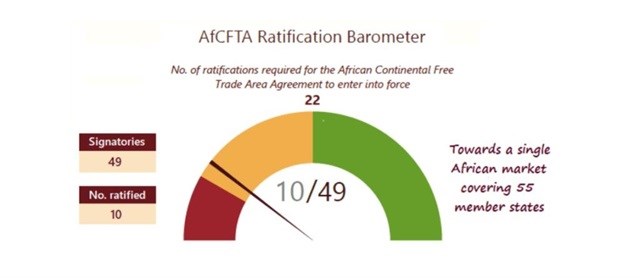Unleashing Africa's economic potential with AfCFTA

As exemplified by AirRwanda’s increase in direct flights between Lusaka and Johannesburg, intra-African trade benefits all participating countries. For instance, Zambia benefits as an intermediary between South Africa and Zambia along one of Africa’s busiest air routes. Likewise, Ethiopian Airlines is currently expanding its African scope to derive similar benefits. However, more cross-border movement of trade is required to match aviation’s lead.
Africa’s internal trade is the lowest of any continent and, as can be seen below, has long remained disproportionately dependent on foreign markets for its total import and export volume.

In total, recent intra-African trade has accounted for approximately 17% of African exports whereas intra-Asian and intra-European trade have accounted, respectively, for 59% and 69% of their own. Only by trading amongst themselves with value-added products, rather than raw natural resources, will African countries be liberated from the financial uncertainty of global commodity trading and dependency on global markets made dangerous by trade wars.
Factors that hold back intra-Africa trade are solvable
Historical under-development of African industry and infrastructure has been one of the key impediments to trade amongst African countries. The precise causes of African under-development are highly complex, involving various factors beyond the scope of this paper. Many countries have opted for the path of least resistance by exporting oil, minerals and raw agricultural products instead of developing their domestic industrial capacity to produce value-added products.
However, this capacity is required not only to achieve more balanced trade but also to create local substitutes for Africa’s many foreign imports. For instance, from Egypt to South Africa, telecom companies are at work on mobile phones that target the specific needs of African users. Such a product would have instant continent-wide appeal.
Intra-Africa trade cannot thrive without products to trade, from consumer goods to food stuffs and ICT services. However, African companies have an innate advantage when it comes to creating consumer goods for Africans because they know what Africans want. Tastes, colours and other preferences may differ from European offerings, which Africans must now purchase because there are no alternatives.
Cote d’Ivoire can develop a chocolate brand more appealing to local African tastes, which may vary from country to country, rather than a Cadbury bar from the UK; and in so doing enjoy greater revenue than shipping out unprocessed cocoa beans that now constitute 80% of the world supply. Similarly, an African-designed and manufactured automobile would be built with African road conditions and African preferences in mind, giving African consumers an alternative to driving the same cars plying the roads of Europe, Japan, or the US.
The bottom line is that African innovation, and investment in these innovations, is required to boost intra-African trade as surely as the need for better road and rail links, open skies that lower costs of inter-continental air travel, and fast clearance of goods and border posts.
AfCFTA is designed to boost intra-Africa trade
Free trade areas have often proved highly profitable for African member countries, with the Common Market of East African States (COMESA), the East African Community (EAC) and the Southern African Development Community (SADC) alone accounting for 72% of intra-Africa trade. This trade is expected to double under the AfCFTA, which was agreed upon by 44 African countries meeting in Kigali, Rwanda, in March 2018. Formal signing of the AfCFTA treaty by South Africa and other countries in July in Mauritania moved the process closer to reality.
AfCFTA aims to create a single continental market for goods and services by freeing trade through high tariff reductions, visa eliminations and the establishment of a regional dispute resolution mechanism.
AfCFTA Ratification Barometer
The smaller African business person, the small and medium enterprises that are the engines of economic growth, will benefit most from the AfCFTA. The trade pact will allow businesses to enter the continental supply chain and raise their status from domestic suppliers to international exporters.
In fact, it is the smaller African business person, the small and medium enterprises, that are the engines of economic growth. Accelerated ICT development would also be assured as companies establish cross-border connections, exchange information and best practices, and employ cloud technology to manage their operations.
In this regard, East Africa’s boom in mobile money, which has successfully integrated millions of African consumers into financial service networks, will surely expand.
Finally, intra-Africa trade will no doubt assist in decoupling African markets from the volatility of foreign markets, thus rendering it less susceptible to fluctuating commodity prices and related sources of instability.
The political will must exist to ensure that national policies take the harder industrial development course over the easier exportation of raw resources. African consumers and the business community must be at the forefront of pushing for intra-African trade that most benefits them.
Key points to consider
- Africa’s inter-continental trade is the lowest in the world, and the habit of trading primarily with non-African countries has hobbled African economies.
- The African Continental Free Trade Area (AfCFTA) agreement creates a continent-wide free trade area endorsed by over 40 countries and lays the foundation for a fundamental shift in African trade.
- Continent-wide competition to create an indigenous mobile phone with Africans’ needs in mind is an example of a popular product that could see traction from Cape to Cairo.
- Value-added industries to make finished products capable of replacing foreign imports, is required to shift trade from away from primary export dependence.
Source: https://www.inonafrica.com.








